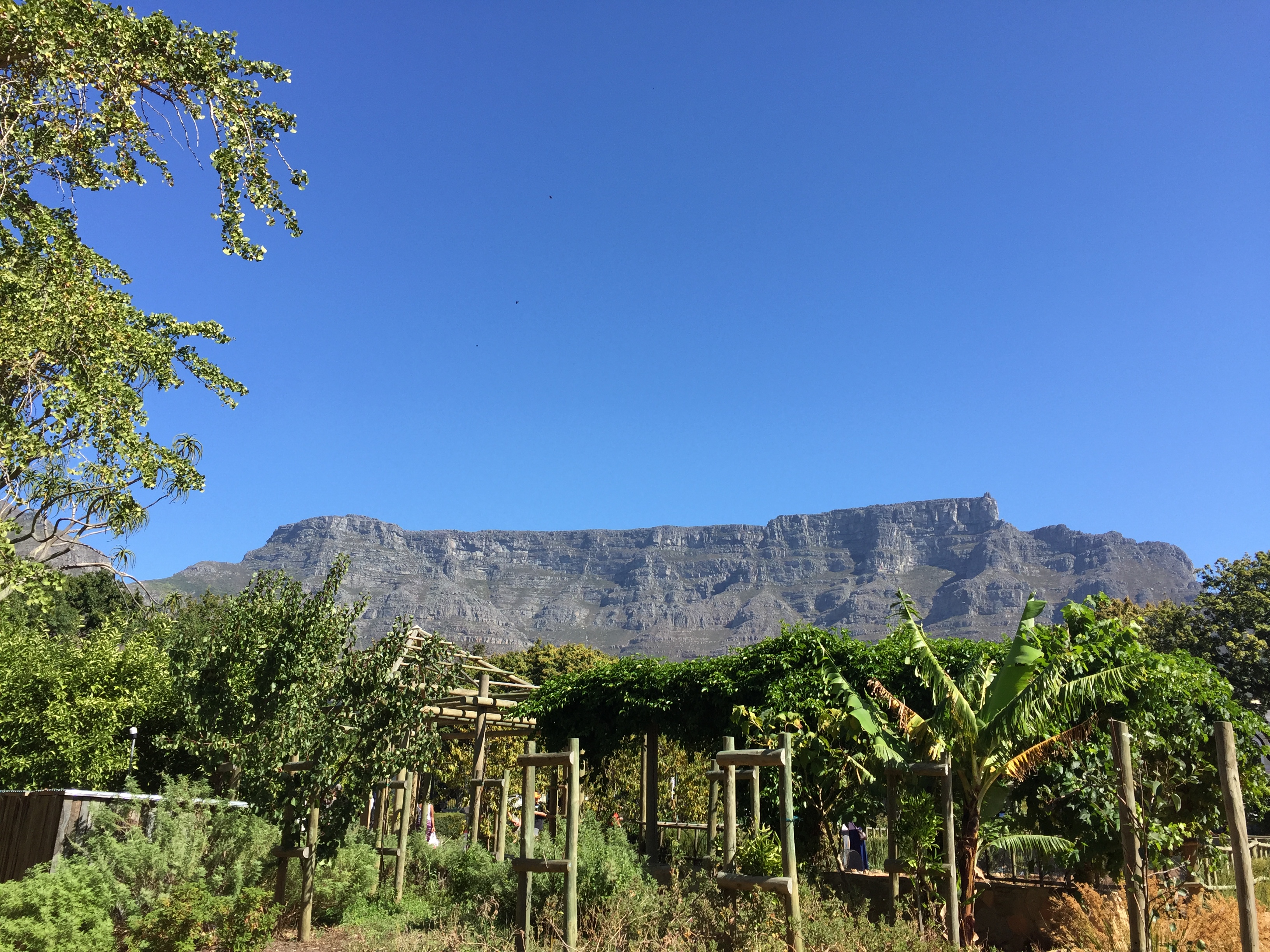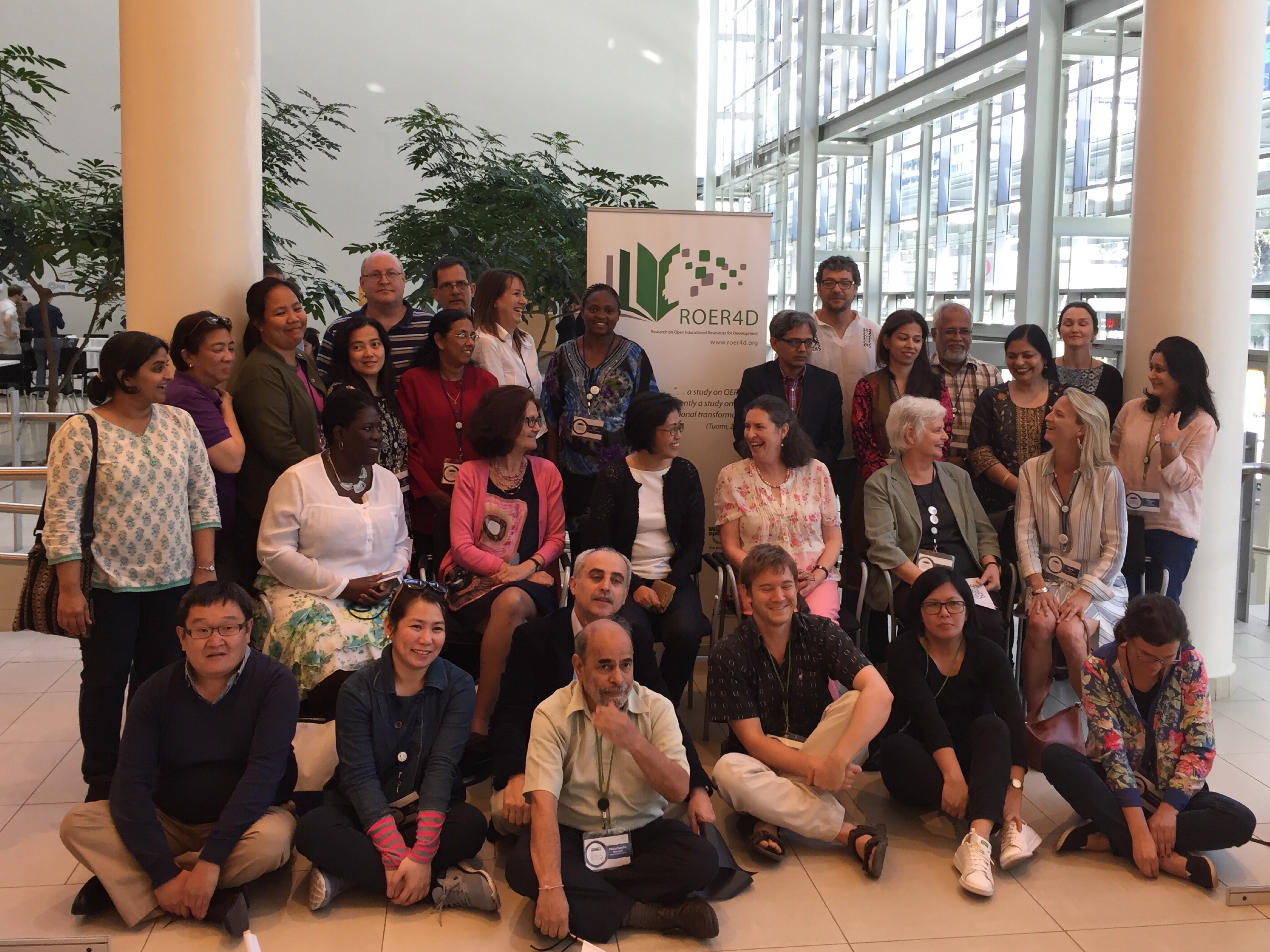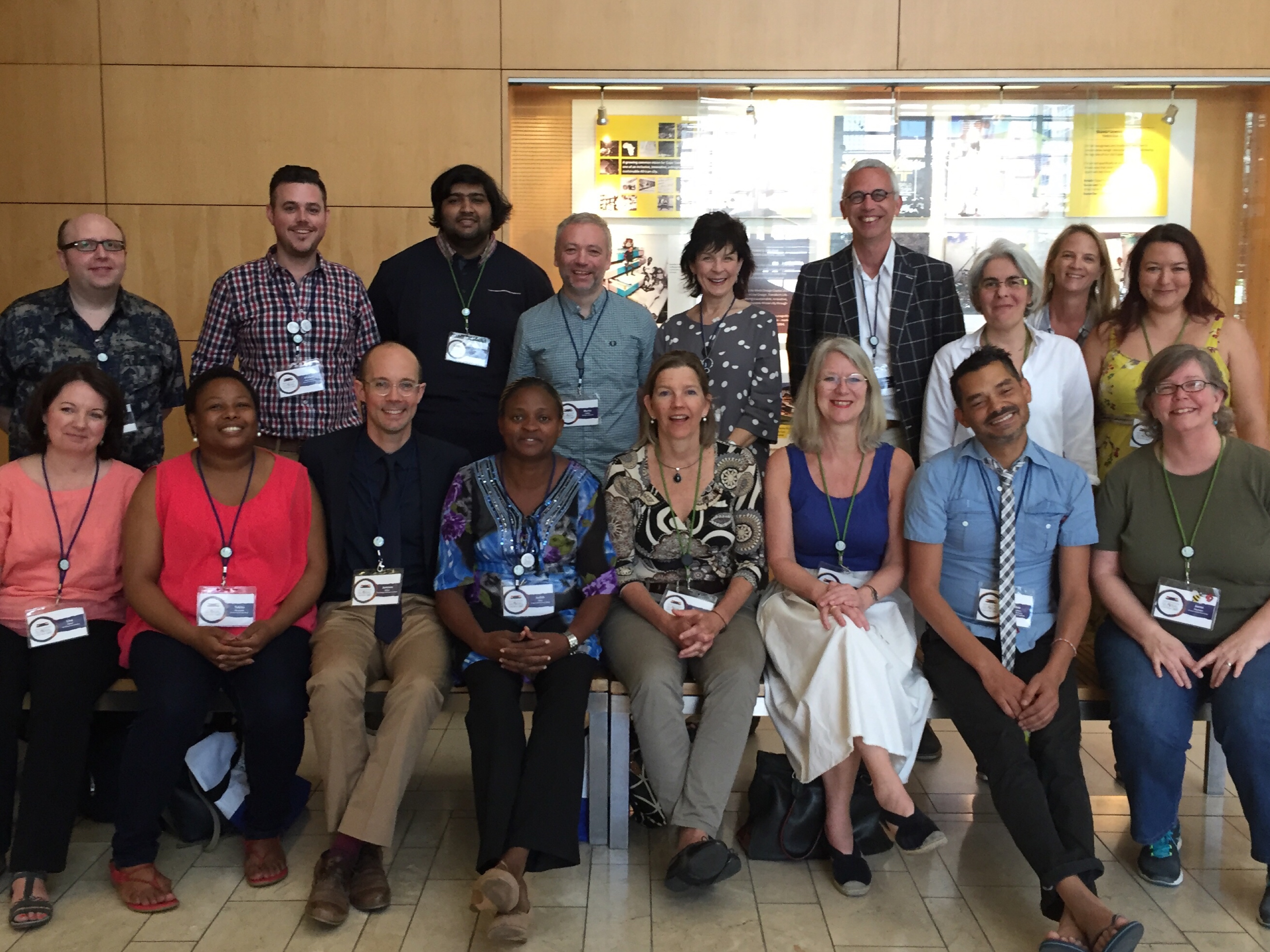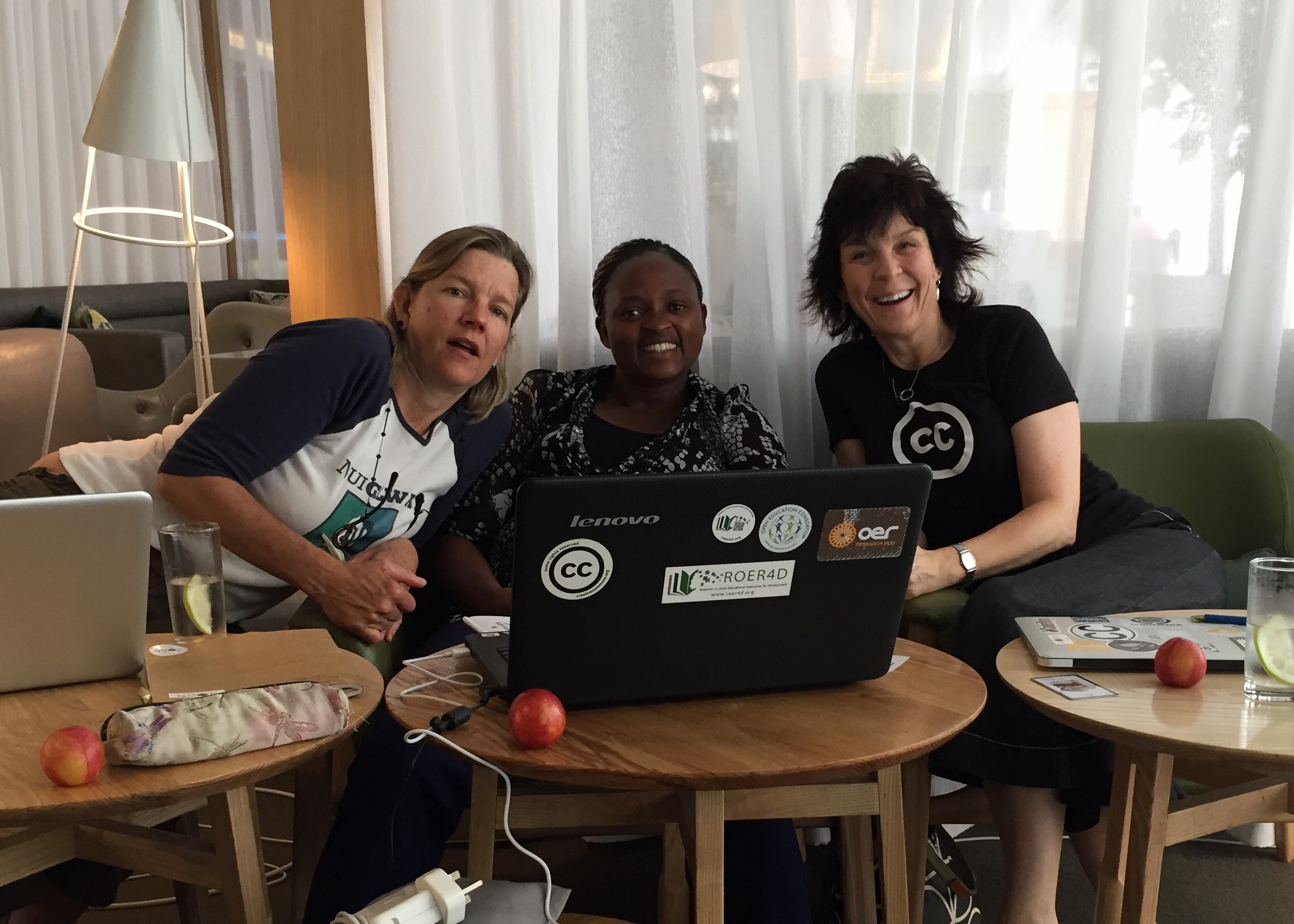
I recently returned from 10 days in Cape Town, participating in the Open Education Global Conference and GO-GN seminar and working with fellow open education researchers at the Centre for Innovation in Learning & Teaching at UCT. All were deeply enriching experiences, both personally and professionally, in a place I’ve come to love after two visits in the past year.
For those who may not know, GO-GN is a global network of PhD students working in open education. The annual 2.5-day GO-GN seminar immediately precedes the OE Global conference, but this event is just part of a broader programme and network of mutual support. Chrissi Nerantzi and Martin Weller have written wonderful blog posts about the GO-GN Cape Town experience already; mine will follow. This post is a summary of some my reflections following the 3-day OE Global conference, particularly with respect to OEP and open pedagogy.
OE Global Conference, Cape Town
This was my first time attending #OEGlobal (after several years following online) and it was deeply worthwhile for the scholarship, friendship, and inspiration. The OE Global programme (with links to most presentations) is well worth exploring, as are the #OEGlobal tweets. Educators and researchers from 47 countries across 6 continents participated in the conference. The range and quality of work was stunning. A standout was the ROER4D project comprising 18 evidence-based OER research studies across the Global South with the aim of improving educational policy, practice, and research in developing countries. There were conference presentations by many of the 18 ROER4D studies as well as a report on the project meta-synthesis by Cheryl Hodgkinson-Williams: Adoption and impact of OEP and OER in the Global South.

Another standout for me was the discussion of work being done by many in the US community college sector to boost college access and completion for underserved and at-risk students through the creation of OER-based or Z-degrees. These efforts and the OER Degree Initiative were discussed in the OER Degrees panel.
A foundational theme of much of the work shared at OE Global was social justice. Many presentations foregrounded social justice as a core value of our work in open education. This began with the opening keynote by Narend Baijnath, continued with the Day Two keynote by Patricia Arinto, and was highlighted in numerous presentations (e.g. by OEPScotland, Preston Davis, Jamison Miller and myself – links are to relevant slides/presentations). Engaging in these conversations in South Africa, following the recent #FeesMustFall protests, provided a powerful opportunity for each of us to consider our work in the context of calls for free and decolonised education. At the conference, Laura Czerniewicz summarised three aspects of decolonising higher education: recognising how power relations are enacted and instantiated in curricula and policies; foregrounding African/Global South content and contexts; and promoting and engaging in dialogue between different epistemic traditions (Global South & Global North). See also Sukaina Walji’s recent post: A role for open education in the #feesmustfall movement in South African higher education.
As always after such a rich feast of ideas, there are far too many strands to explore fully. However, one is closely related to my PhD research in open educational practices. There was much discussion at the conference about both OEP and open pedagogy. How do these concepts relate to one another? They overlap, but how exactly? There is a great deal of work going on in both #OEP and #openped at the moment, so how might we productively join some of these conversations?
OEP and open pedagogy
For some time now I’ve been paying attention not just to the nature of the work being done by many in the global open education community, but also to differences in emphasis across different sectors and regions. For example, much foundational work in open textbooks is rooted in and continues in North America (e.g. BCcampus Open Textbook project and Z-Degree programmes). More recently, a flourishing movement has emerged around open pedagogy (check out #openped) led by innovative educators such as Robin deRosa, Karen Cangialosi, Scott Robison, Rajiv Jhangiani, David Wiley, and others.
In the UK, and to a certain extent here in Ireland, there is much work/discussion re: OER, less emphasis (though increasing) on open textbooks, and a deep and growing engagement with OEP and critical approaches to openness. These emphases will feature prominently in the upcoming OER Conference #OER17 ‘The Politics of Open’ (April 5-6), as they already do in projects and networks such as the Open Education Research Hub (who also support GO-GN), ALT’s Open Education SIG, Open Scotland, OEPScotland, and UK OER (the UKOER project officially ended in 2012 but the community continues via #ukoer and @ukoer – thanks to @dkernohan).
With its truly global scope, OE Global provided an opportunity to learn from and about a diverse range of research and researchers. I attended as many OEP and open pedagogy sessions as was possible and spoke with many, many wonderful open scholars. Following the conference, as part of my own research, I searched the conference programme and #OEGlobal tweets for terms related to OEP and open pedagogy. Despite these efforts, it’s likely I have omitted something important. Apologies in advance – and please do add a comment to this post if you wish to add some missing work or a different interpretation. Our work can only improve with multiple perspectives.
OEP and open pedagogy presentations at OE Global
The global scope of OEP work was very clear at the conference. Research explicitly mentioning OEP was shared by researchers from 11 different projects/studies based in South Africa, Tanzania, Uganda, Sri Lanka, Mauritius, Tasmania, Brazil, Canada, Scotland, and Ireland. A further 3 presentations focused specifically on open pedagogy, from projects based in South Africa, the US, and the Netherlands.
- Making MOOCs and changing OEP by Laura Czerniewicz, Andrew Deacon, Sukaina Walji, Michael Glover (University of Cape Town)
- Development of the OEP Impact Evaluation Index by Som Naidu & Shironica Karunanayaka (ROER4D & The Open University, Sri Lanka)
- Conceptualising OEP in teacher education in East Africa by Freda Wolfendon (ROER4D study in Mauritius, Tanzania & Uganda)
- Towards ethical OEP in times of disruptions by Daniela Gachago, Eunice Ivala, Cheryl Belford, Xena Cupido, Hillary Hartle, Suzaan Le Roux, Candice Livingston, Janine Lockhart, Andre Steenkamp, Bronwyn Swartz (Cape Peninsula University of Technology, CPUT)
- Papert’s constructionism: A felicitous partner of OEP by Linda van Ryneveld (University of Pretoria)
- Exploring OEP of first year students at a South African university by Tabisa Mayisela (University of Cape Town)
- Southern hemisphere OEP: A comparative analysis between Australia and Brazil by Carina Bossu (University of Tasmania) & Marineli Meier (Federal University of Parana)
- The role of educational developers in supporting OEP by Michael Paskevicius & Vivan Forssman (Royal Roads University)
- Opening practice on participatory course production and OEP in Scotland case studies & courses by Anna Page, Pete Cannell & Ronald Macintyre (The Open University, Scotland)
- Openness and praxis: Exploring the use of OEP in higher education by Catherine Cronin (National University of Ireland, Galway)
- A narrative of open pedagogy using OER by Cheryl Belford (Cape Peninsula University of Technology, CPUT)
- Current OER Research from the OER Research Fellows including Thoughts on open pedagogy by John Hilton III (Brigham Young University)
- Connecting OER to teachers using open pedagogy by Martijn Ouwehand (Delft University of Technology) & Robert Schuwer (Fontys University of Applied Sciences)
Many of the OEP studies referenced earlier foundational work in open educational practices. These key papers can be considered in three main groups:
i) work emerging from CILT (Centre for Innovation in Learning & Teaching), University of Cape Town — focusing on 5 dimensions of openness: technical, legal, cultural, pedagogical, financial.
- Hodgkinson-Williams, C. & Gray, E. (2009) Degrees of openness: The emergence of OER at the University of Cape Town
- Hodgkinson-Williams, C. (2014) Degrees of ease: Adoption of OER, open textbooks and MOOCs in the Global South
ii) work arising from the Open Education Quality (OPAL) Initiative (2010-11) — espousing a definition of OEP linked closely to open pedagogy: “collaborative practice in which resources are shared by making them openly available, and pedagogical practices are employed which rely on social interaction, knowledge creation, peer-learning, and shared learning practices.”
- Ehlers, U.-D. (2011) Extending the territory: From OER to OEP
- Conole, G. & Ehlers, U.-D. (2010) OEP: Unleashing the power of OER
iii) work arising from the UK OER Programme (2009-2012) — using an expansive definition of OEP including the creation, use and reuse of OER as well as open pedagogies, open learning, open access publishing, and use of open technologies.
- Beetham, H., Falconer, I., McGill, L. & Littlejohn, A. (2012) Open Practices: Briefing Paper
In addition, 2 of the 3 open pedagogy presentations (and some OEP presentations, e.g. Gachago, et al.) referenced the 8 attributes of open pedagogy model:
- Hegarty, B. (2015) Attributes of open pedagogy: A model for using OER.
Summary
The above gives an indication of the scope and nature of research shared at the OE Global conference in the areas of OEP and open pedagogy. While it might seem from the summary here that open pedagogy was a minor strand of the conference, the discussion of open pedagogy was not limited to the 3 sessions listed. Open pedagogy is, of course, a key element of OEP. Together, OEP and open pedagogy comprised a main strand of discussion at the conference: in the sessions, in the panel discussions, and in many informal conversations.
For those of us working in open education, myself included, the work shared at OE Global provides a strong basis for discussion, comparison, and potential collaboration. Some important areas which I would like to explore further, in my own research and in collaboration with others, are these:
- Decentering northern epistemology. With global research funding, production, and dissemination skewed so heavily toward the Global North, it may be easy for many in the North to fail “to see” global inequalities in knowledge production. But see we must. Researchers in the Global North have a collective responsibility to deepen our awareness of epistemic traditions beyond our own, to challenge deeply held assumptions about knowledge and power, to promote and engage in South-North dialogue and collaboration, and much more. As noted by the ROER4D project during the conference, this is particularly important in open education.
- The relationship between OER and OEP/open pedagogy. A growing number of research studies, across different contexts, reveal an increasingly complex relationship between OER and OEP/open pedagogy. In addition to OER opening the door to OEP/open pedagogy, the reverse may also be the case. This has emerged in my research (in Irish higher education) and in research studies by Czerniewicz, et al. (in South African higher education) and Penny Bentley (in Australian secondary education). I believe these findings are important and may be part of an inflection point in open education. What is emerging in other contexts?
- Defining OEP and open pedagogy. One of the many benefits of attending OE Global was the opportunity to discuss these challenging questions with many of the people whose work informs and inspires my own. I know, for example, that David Wiley defines open pedagogy very precisely as “the set of teaching and learning practices that are only possible or practical in the context of the free access and 5R permissions characteristic of open educational resources”. My research focuses on how open educational practices emerge in contexts where open education/OER policies do not exist. David and I approach our work from different standpoints, but seek to address similar questions. At the conference, David and I discussed this. We both agreed that open pedagogy is a constituent of OEP. But the door is open for further discussion and work. What else is useful and important in building definitions and frameworks of open pedagogy and OEP?
This work continues.
~~~~~
As a postscript, here are links to the work that I shared at the OE Global conference: “Openness and praxis: Exploring the use of OEP in higher education” paper, presentation, and links to all papers referenced in my presentation.
My sincere thanks to the wonderful OE Global conference chair Glenda Cox, the programme committee and conference organisers, all of the conference presenters and participants, and to my inspiring GO-GN colleagues. Thanks to you all for an amazing week in Cape Town — the scholarship, friendship, music, drumming and dancing. Unforgettable.
~~~~~


Images: all images CC BY-SA catherinecronin on Flickr
Hi Catherine,
Wow, you brought many special memories together in this detailed and informative post that gives us all a rich flavour of your experience at the conference. The wonderful potpourri of resources you also share, provides further food for thought and exploration. I don’t know where to start… experiencing now similar dilemmas to yours 😉
Interesting what you say about OER, OEP, open pedagogies but also the North and South situation. For me this all needs to go into the same pot somehow and joined-up? It is perhaps the disconnect that creates the challenges, the difficulties to help us all see the bigger picture and do something about it collaborative that can work and help others get the value of open? Wondering what your thoughts are around this.
You also raise an important question: “What else is useful and important in building definitions and frameworks of open pedagogy and OEP?” I am looking forward to further discussions and explorations around this but am also wondering if it is about building definitions and framework or getting robust evidence for their construction and application in practice? Wondering if we do need to listen more and respond critically and creatively?
Viv and I were invited to write a little post about the conference for Javiera Atenas, Open Knowledge Foundation (not sure when this will be made available) but we just added a link to your post as we feel that your personal story, explorations and discoveries will be interesting for others too.
Tuko pamoja dear Catherine.
Chrissi
ps. Thank you for linking back to my little #go_gn post
Chrissi, thanks so much for your generous comment, very thoughtful. You pose an interesting question re: the value of models/frameworks vs. gathering evidence. I would say Both/And – I think these are mutually supportive. As researchers we work closely with participants: listening to stories, responding, gathering data, developing new understandings of practices and phenomena. Then we work further to share our work with others, seeking to build greater shared understanding. Creating models and frameworks can be important part of that communication, I believe – a way of connecting the particular to the universal.
I’m thinking of one example: Viv Rolfe and I created a Go OPEN wiki a couple of years ago (as part of an #ALTC workshop) http://wikieducator.org/GoOPEN especially designed for practitioners wishing to further open practice in their institutions. We collected and shared 6 models for defining/mapping openness. This has proved to be the most popular section of the wiki – providing simple ways to facilitate communication, collaboration, and creative problem-solving.
Like you, I think we need “joined-up” thinking re: addressing these challenges. This points us clearly towards collaboration – especially across geographical, cultural, sectoral, and other boundaries. OE Global was a wonderful example of that, so happy to have been a part of it with you. We will keep learning together. Tuko pamoja.